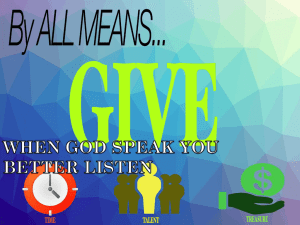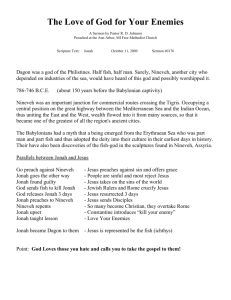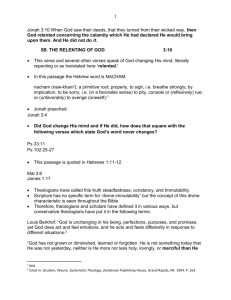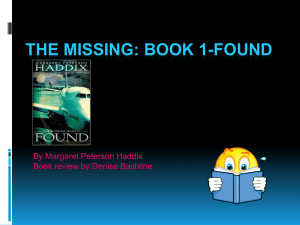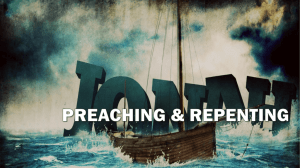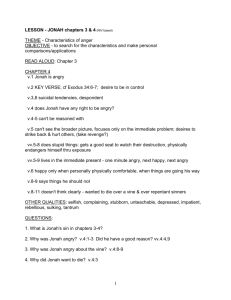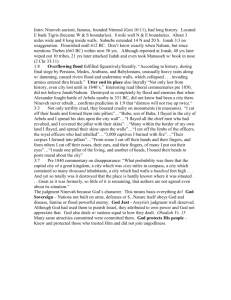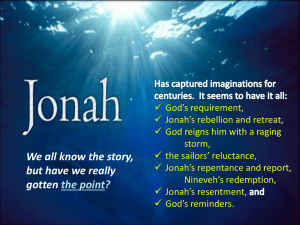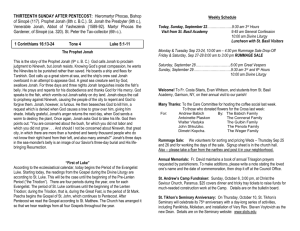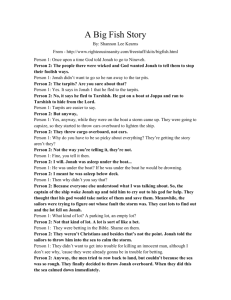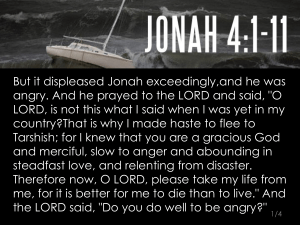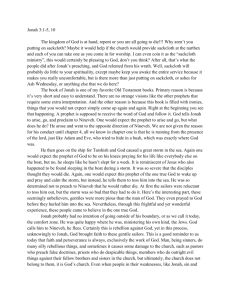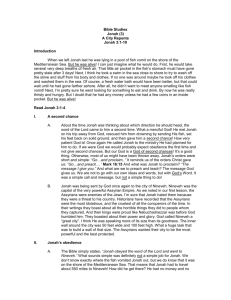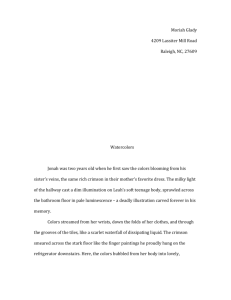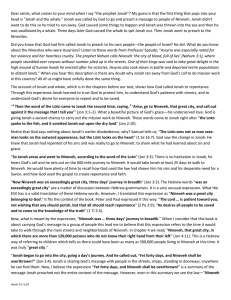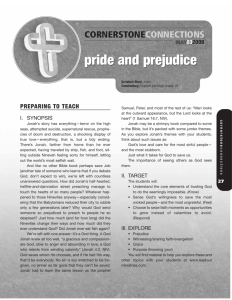The Power of One Reluctant Person Jonah 3:1-5
advertisement
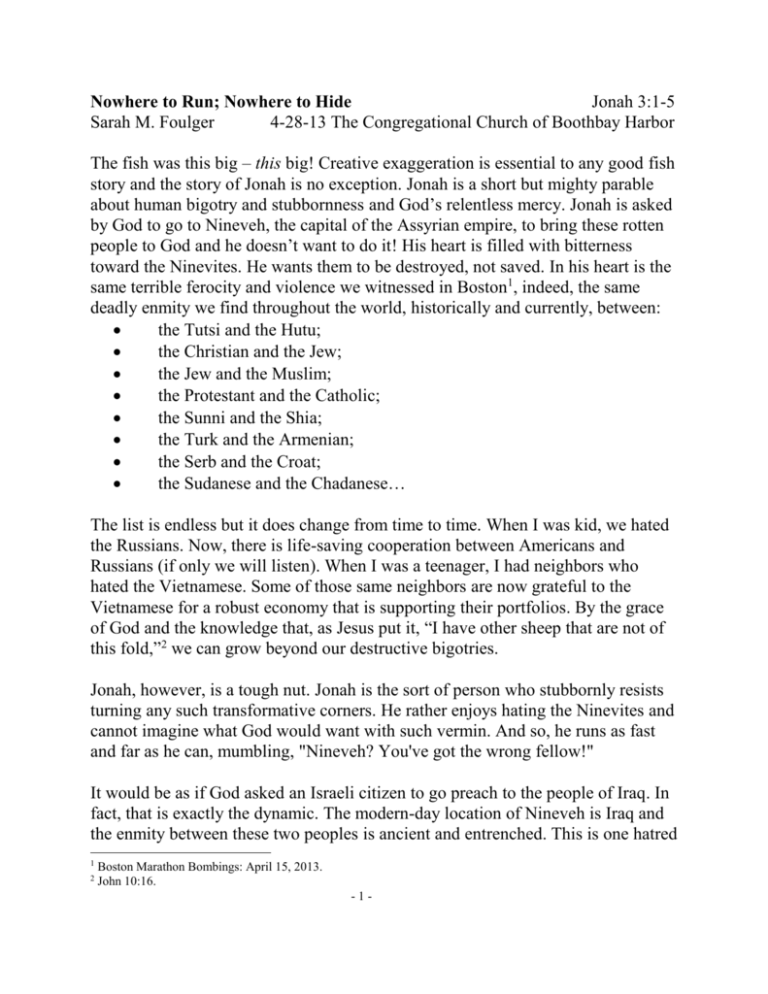
Nowhere to Run; Nowhere to Hide Jonah 3:1-5 Sarah M. Foulger 4-28-13 The Congregational Church of Boothbay Harbor The fish was this big – this big! Creative exaggeration is essential to any good fish story and the story of Jonah is no exception. Jonah is a short but mighty parable about human bigotry and stubbornness and God’s relentless mercy. Jonah is asked by God to go to Nineveh, the capital of the Assyrian empire, to bring these rotten people to God and he doesn’t want to do it! His heart is filled with bitterness toward the Ninevites. He wants them to be destroyed, not saved. In his heart is the same terrible ferocity and violence we witnessed in Boston1, indeed, the same deadly enmity we find throughout the world, historically and currently, between: the Tutsi and the Hutu; the Christian and the Jew; the Jew and the Muslim; the Protestant and the Catholic; the Sunni and the Shia; the Turk and the Armenian; the Serb and the Croat; the Sudanese and the Chadanese… The list is endless but it does change from time to time. When I was kid, we hated the Russians. Now, there is life-saving cooperation between Americans and Russians (if only we will listen). When I was a teenager, I had neighbors who hated the Vietnamese. Some of those same neighbors are now grateful to the Vietnamese for a robust economy that is supporting their portfolios. By the grace of God and the knowledge that, as Jesus put it, “I have other sheep that are not of this fold,”2 we can grow beyond our destructive bigotries. Jonah, however, is a tough nut. Jonah is the sort of person who stubbornly resists turning any such transformative corners. He rather enjoys hating the Ninevites and cannot imagine what God would want with such vermin. And so, he runs as fast and far as he can, mumbling, "Nineveh? You've got the wrong fellow!" It would be as if God asked an Israeli citizen to go preach to the people of Iraq. In fact, that is exactly the dynamic. The modern-day location of Nineveh is Iraq and the enmity between these two peoples is ancient and entrenched. This is one hatred 1 2 Boston Marathon Bombings: April 15, 2013. John 10:16. -1- that has, unfortunately, not changed. The point of the story of Jonah is that God is the God of all people, not just a privileged few or a chosen few or a well-behaved few or the ones who pledge allegiance to Jonah’s flag or to any particular flag. But, you see, Jonah cannot bring himself to believe any of that. He doesn’t want to believe it. He can’t stomach the Ninevites. And that is precisely what makes him such a powerful figure. By God’s standards, he is uniquely qualified for this job precisely because he is that the last person on the planet you’d expect to find helping out a Ninevite. ************************* This big fish story was written within the Hebrew community after the Hebrews returned home, having been exiled and enslaved for generations. There was great and understandable hostility among the Hebrew people after the exile, including hatred toward those who had held them captive for so long. There was a widely held sentiment that their captors were deserving of God's severest judgment & punishment. But this amazing story bravely challenged such thinking and reminded the Hebrew people that God is merciful, slow to anger, and abounding in steadfast love, that God is the God of all people, loves them all, and wants to redeem them all. This simple message is surely just as pertinent today as it was so long ago. The God we worship is the God of all people, not just those who live where we do or wear what we wear or eat what we eat or think as we do or believe as we do. There is no caste system in the economy of God's love and mercy. This message is as important today as ever: All people are God's people, God's children. Jonah, having pronounced eight little words to the Ninevites, "Forty days more and Nineveh shall be overthrown!" had the whole town in sackcloth and ashes, ready to live more godly lives. In Hebrew, it was just 4 words: arba’im yom Nineveh haphak. It was the shortest most effective sermon on record preached by someone who had no interest in preaching it. Even Jonah, with his bad xenophobic attitude was a productive agent of God’s mercy. And so, when you are feeling as angry as Jonah about certain horrible groups of people, whoever the Ninevites du jour are, may you be reminded that our judgment -2- and God’s mercy are not even close. When you are ready to string up every ethnic Chechen or Muslim who ever lived, think of the uncle of those boys who, from his home in Maryland said, “I love this country, this country which gives a chance to everybody else to be treated like a human being, and to just be a human being to feel yourself human being.” When the very thought of your enemy throws you into the belly of the whale where it is dark, hostile, and unbreathable, think of what Cardinal Sean O’Malley preached in the wake of the bombings. He said, “ In our own hearts when we are unable to forgive we make ourselves a victim of our own hatred.” Better yet, think of what Jesus preached to a crowd that was hoping the Messiah would come along with a big deadly sword to smite the Romans. To such as these, he preached: “Love your enemies and pray for those who persecute you. In this way you become God’s children. Haven’t you noticed God makes the sun rise on the evil and on the good, and sends rain to the righteous and on the unrighteous. If you only love those who love you…” …well, then, you are a very small fish indeed. -3-
